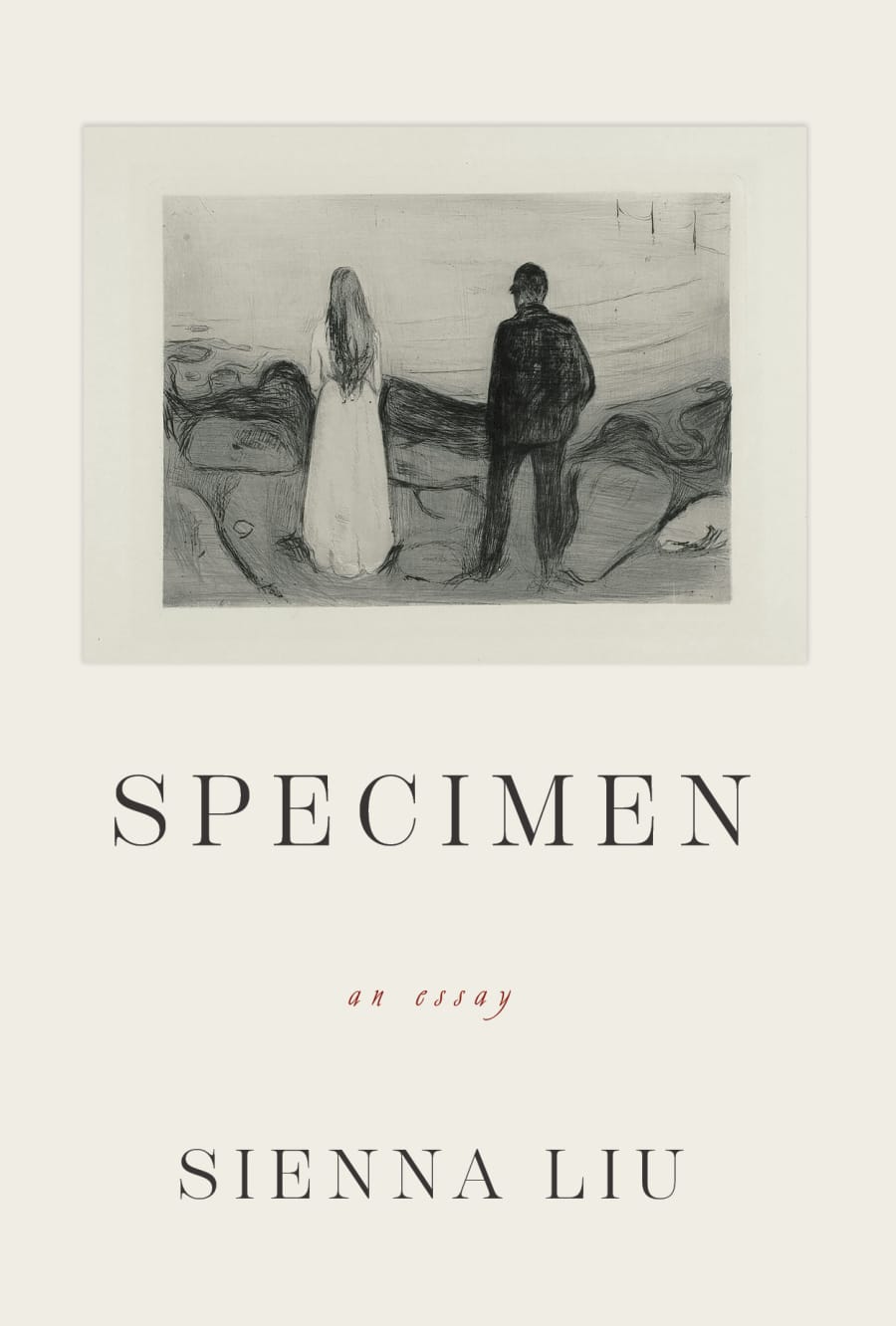Unreality as Liberation in Sienna Lui's Specimen
by mk zariel
the world’s beautiful, but it’s not real, declares the narrator’s love interest amid an idyllic vignette–the two lovers taking in a concert, pretending to be familiar with the artist and venue, trying to impress one another, and then solely trying to belong. They fall in love where “there was an artificial lake, maybe two hundred bars, and four hundred guitarists. It was not real.” Thus, it is not stability and its quiet joy that unite them but the generative tension of unreality.
These characters are the central figures in author and translator Sienna Liu’s book-length lyric essay Specimen, out in 2025 on Split/Lip Press. Specimen, dubbed an “emotional, somewhat surreal mosaic” by author Maggie Olszewski, focuses on the story of two young lovers with a literary bent who construct a narrative of their relationship in diary entries, messages, and vignettes. This essay transcends the traditional form of the romantic novel, focusing on the characters’ inner lives rather than the particularities of their relationship; thus, it is not only a compelling narrative but a liberatory meditation on the human condition.
As Specimen opens, the two characters meet at a party. The sparks immediately fly, with E, the love interest, exuding an air of studied mystery: “E. pulled out of his backpack, in this particular order: a bottle of Bombay Sapphire, a pack of Tarot cards, and a coffee pot. Mesmerizing, as I said” (p. 9). A storyteller and ephemeral figure, E captures the protagonist’s heart, and the two begin spending all their time together. Yet, a complication immediately arises– E is only temporarily staying in the protagonist’s hometown of Cape Town and will soon return to London to finish his studies. He leaves unceremoniously, in the company of loose acquaintances, and the protagonist fixates on the poetry they wrote and narratives they built together.
Meanwhile, E distracts himself and is “always drunk, always dancing, always listening to some band I never heard of, and always being chased after. He talked about the men or women or girls or boys who admired him, stalked him, lured him with sunny and dark things alike” (14). He occasionally sends a postcard or a text, growing more and more removed.
Only then do they meet up in Beijing for a concert, connecting in a city neither of them live in, in person for the first time in months–then detach from one another yet again, with E distracted and the protagonist in a perpetual state of longing. E expresses a desire “to be someone who cannot be described and cannot be defined by words” (30). The protagonist can only find this pretentious. This section is not only warmly stereotypical–describing the follies of young love and the impossibility of maintaining a connection– but has a quiet kind of hope to it. Despite this relationship’s distance and ephemeral nature, Liu ultimately frames it as an experience of growth, thus dismantling the straightness of the proverbial “relationship escalator” in which all romance is unworthy unless it moves toward the goal of marriage and a self-replicating nuclear family.
In Specimen, amatonormativity is irrelevant, with the characters existing in a liminal space that has more to do with their literary inclinations and unruly desires than any semblance of an idealized future. The protagonist of Specimen then does what so many creatures do at some point, burrowing into her special interests and places of rightness: “read madly, vengefully. Always reading, reading, reading literature, philosophy, criticism, especially when these things no longer meant anything to him” (46). Even critical theory reminds her of her beloved, and that is when she knows all is lost. When they reunite, however, his theoretical bent eventually strikes her as utterly detached in a harmful way. She writes about his lack of jouissance, citing Lacan, and thus breaking her standards surrounding literary pretension. Still, she travels to London with him, meticulously planning their trip, only to realize that his approach to travel is more nebulous and inexact. They then debate each other over the definition of a relationship rather than ever directly feeling their desire.

The story subsequently flashes forward to a scene in which Liu’s protagonist “stumbled in all kinds of emotions so I decided I would go to bed with the first person who spoke to me” (71). In her haste to forget E., she dives into brief, casual relationships, then lapses into depression upon receiving his farewell note–until, yet again, they reconnect.
Their sense of belonging together does not follow a linear pathway but instead spirals toward an imperfect yet joyous understanding of one another, built on years of conflict and generativity. Thus, Liu argues that relating is anything but linear, taking place in the fluid, literate mind rather than through the structure and clockwork of standardized life pathways.
mk zariel {it/its} is a transmasculine poet, theater artist, movement journalist, & insurrectionary anarchist. it is fueled by folk-punk, Emma Goldman, and existential dread. it can be found online at https://linktr.ee/mkzariel, creating conflictually queer-anarchic spaces, and being mildly feral in the great lakes region. it is kinda gay ngl.




